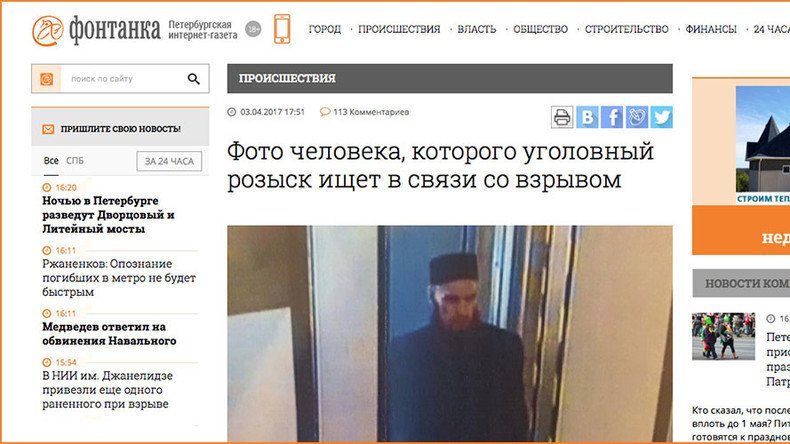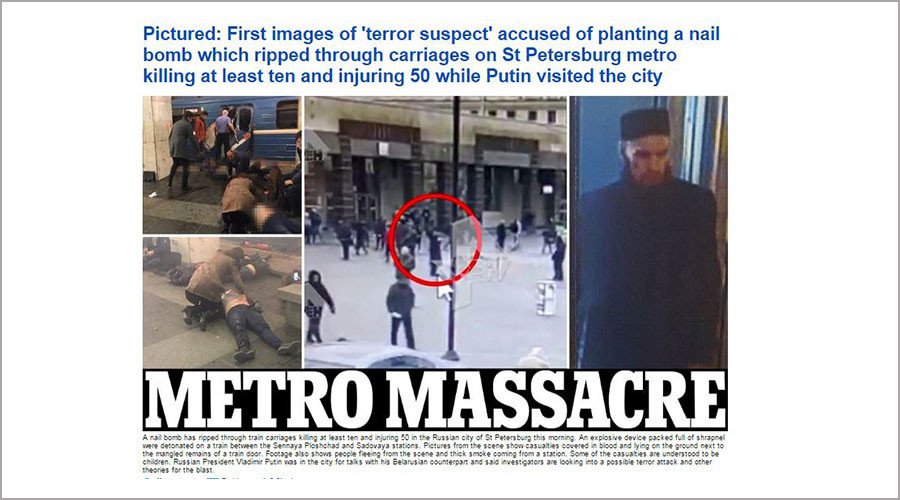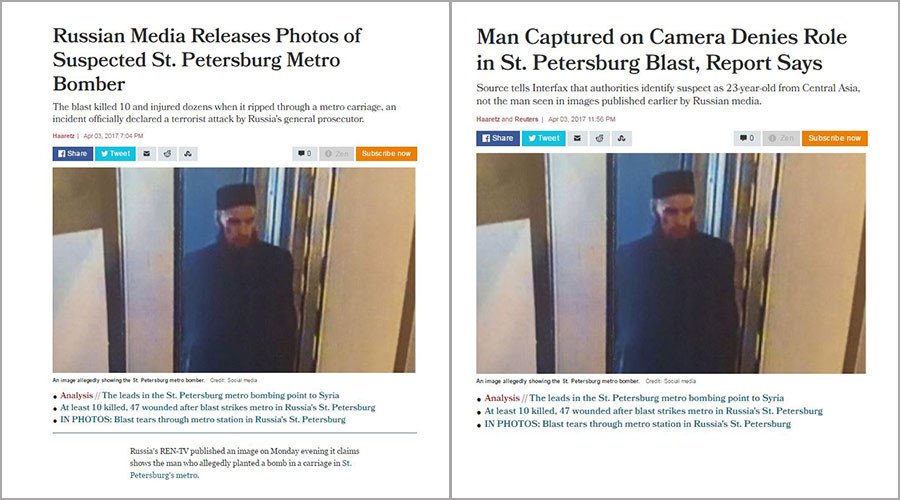Share responsibly: How innocent people fall victim to unverified reporting during terrorism alerts

In the modern information-driven world a person can easily fall victim to false accusations, as the online rumor mill and click-hungry media rush to find someone to blame for various emotionally-charged crimes. The apparent bombing in the St. Petersburg Metro is just the latest example.
The Monday blast, which killed 14 people and left dozens injured, produced two cases of false accusations. Hours following the apparent bombing, a CCTV image of a man with a long beard and dressed in long clothes and a hat was leaked to several media outlets. They speculated that he was the possible organizer of the suspected terrorist attack. Hours later the man went to a police station, protesting his innocence.
The man, later named as Ilyas Nikitin, was apparently guilty of having an appearance that conforms to the public’s expectations of what a terrorist looks like. According to the IslamNews web portal, he was born in the Russian region of Bashkortostan, trained as an airborne trooper and served in the Chechen Republic, retiring with the rank of captain.
Ильяс Никитин, заподозренный в теракте в петербургском метро, похвалил спецслужбы - https://t.co/UOoEO0DAcU
— IslamNews (@islamnovosti) April 4, 2017
He said he converted to Islam and observes religious traditions in clothing and hairstyle. He praised the St. Petersburg police for their response to the blast, and said he offered his full cooperation with the investigation, both to clear his name and because it was his responsibility as member of the Muslim community.
Another person caught up in the misreporting was Maksim Aryshev, who was named by some Russian media outlets as the suspected suicide bomber. He was a 20-year-old Kazakhstan national studying at university in St. Petersburg, and was killed in the metro explosion. Neither his social media profile nor the accounts of his friends provided any proof of the accusation he was behind the blast, while the Kazakh security services said they had no evidence that he was an extremist.
Казахстанец Максим Арышев скончался в результате теракта в Санкт-Петербургеhttps://t.co/iDO2hloo2Jpic.twitter.com/3g4wAm6est
— Tengrify! (@tengrifyme) April 4, 2017
By all indications he was a regular guy, who happened to be in the wrong place at the wrong time. His parents now have to cope not only with grieving for their son, but also with media reports branding him as terrorist. The accusation apparently stems from him being close to the center of the explosion.
False accusations like these are often given a helping hand on social media.
Nikitin handed himself in on seeing reports of his supposed involvement and is not believed to be a suspect at all. In an article described as an ‘exclusive’, Russian broadcaster REN TV ran a somewhat blurred image of the man on its website. However, its post on Twitter was much clearer.
Other publications ran similar images. Furthermore, the nature of Twitter meant a shot where the man was clearly identifiable could easily be found.
#ЭКСКЛЮЗИВ
— РЕН ТВ | Новости (@rentvchannel) April 3, 2017
Публикуем фото предполагаемого террориста, устроившего #взрыв в #метро Петербурга: https://t.co/6IYGIorlFVpic.twitter.com/6Po3RCy46f
Russian media releases photos of suspected St. Petersburg metro bomber https://t.co/OKYouxc1rf
— Haaretz.com (@haaretzcom) April 3, 2017


The desire - although often well meaning - to break new information faster than competitors is an issue that has led many of the biggest news outlets down a dangerous path, one that has been labeled as “Me First” journalism by Storyful founder Mark Little.
“The anonymous Twitter user rushing to name a suspect or the TV reporter breathlessly quoting unnamed sources are cut from the same cloth. This is ‘Me First’ journalism, powered by vanity and self-importance, and it is the greatest threat to ‘True Journalism,’” Little wrote in 2013.
Back then the Irish journalist was referring to “train wreck” coverage of the Boston Marathon Bombings - some of which involved CNN and a New York Post report featuring an image of Salaheddin Barhoum, who eventually settled a libel case with the newspaper.
The bombing also saw a digital witch hunt ensue on Reddit, for which the social media site later apologized.
However, Little could just as easily have been talking about the time Fox News wrongly identified the 2017 Quebec mosque shooter as being of Moroccan origin, or the St. Petersburg Metro blast or the recent attack in Westminster.
After Khalid Masood used a rented car as a weapon in Westminster, London, on March 22, initial reports wrongly named hate preacher Abu Izzadeen as the perpetrator. Channel 4 led the way, while Izzadeen’s name was also shared widely across Twitter.
The source I trusted, but ultimately I made a mistake. This time I got it wrong. Abu Izzadeen is in prison.
— simon israel (@simonisrael) March 22, 2017
In case you don't know yet.. This is the attacker IBU IZZADEEN, mention his name worldwide. Fortunately he died. https://t.co/UvOx0jQBHB
— annette kiel (@annettekiel) March 22, 2017
Among the publications to follow Channel 4’s lead were Business Insider, the Independent UK, and unfortunately, RT.com.
The media race to break news first coupled with people’s insatiable appetite for global updates is a reminder that aggregation and social media mining can only be relied on to a point – a sentiment expressed by the American writer David Carr in the documentary ‘Page One: Inside the New York Times’.
“The end of the New York Times wouldn’t be that big of a deal, they say, because tweets, blogs and news aggregators could create a new apparatus of accountability,” he said. “But some stories are beyond the database. Sometimes people have to make the calls, hit the streets and walk past the conventional wisdom.”
It’s also a reminder that we all share the responsibility to question more.
The statements, views and opinions expressed in this column are solely those of the author and do not necessarily represent those of RT.













